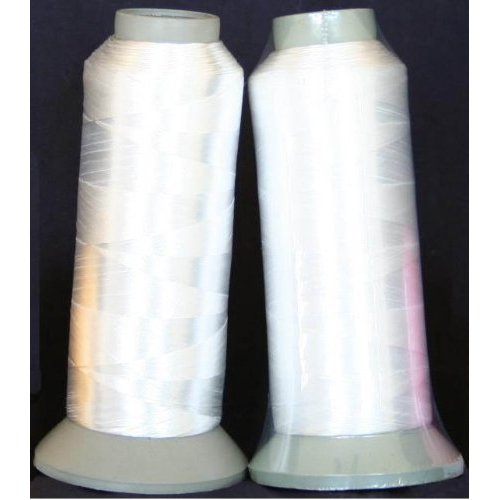Can a large roll of dental floss help you retire more comfortably?
In a recent post, I complained about the very high price of blank label stock for ‘cheap’ handheld label makers.
I concluded that the smart thing to do is use a computer to compose the labels, and print on tractor fed labels with an old-school dot matrix printer. The price differential is astounding. It costs about 25 cents per label to use a ‘cheap” handheld label maker. It costs about 1/2 cent per label to use a computer and dot matrix printer. I decided to use a 10 cent pen to handwrite headings on my manilla file folders, and skip both of the above options.
This crazy pricing for labels made me think of another example of crazy pricing for an even more commonly used product — dental floss.

10,000 meters of white sewing thread for $10.45. If this were dental floss, the price would be nearly $300, but why?
Why does dental floss cost about 2.5 cents a foot in retail quantities? While it’s not the same thing, I can buy 10,000 meters of white sewing thread for $10.45, or roughly 1/10th of a cent per foot – about 1/25th the price.
Dental floss is not sewing thread, so floss probably costs more to make. For the sake of argument, let’s agree it costs twice as much as sewing thread to make. That should mean someone should be able to sell it for 2/10th of a cent per foot
Now, if I could just find a source for a spool of dental floss the size of commonly available large spools of sewing thread, I’d be thrilled.
Such a roll of dental floss would probably last for 5 years. It’s simply crazy that something everyone in the world should be using daily can only be bought in tiny little rolls that costs dollars for a few dozen yards. The price per inch is outrageous compared to bulk sewing thread like you see in dry cleaners on their industrial sewing machines.
If there were a facial tissue box sized roll of dental floss, it could be housed in a pretty box the size of those covers they make for facial tissue boxes. These boxes could have a hinged lid and could become an attractive bathroom accessory in every house in the developed world. A progressive company with real manufacturing connections should source the dental floss and make the decorative boxes. I’m thinking Ikea or Costco should take this project on.
I’ve read that each dollar one can take out of ones monthly budget, if saved and invested properly, turns into $700 at retirement! This country has a huge problem with people not having enough savings for retirement. If we could just stop fritering away money on overpriced essentials, we could collectively save enough for retirement, with no reduction in standard of living. Think how convenient it would be to buy dental floss twice a decade instead of once a month. Dental floss doesn’t go bad and you need it constantly. Why buy in tiny quantities when huge bulk quantities are still small in size.
Somehow Costco got us to buy dozens of rolls of toilet paper at once. I’ve read that toilet paper is the best selling product at Costco. I think some company can get us to buy a lot of dental floss at once as well. Who will it be?
The above thinking can be easily applied to dozens of household essentials we’ve been trained to buy in tiny packages. Why can I buy a gallon of liquid handsoap, but I can’t buy a gallon of gel underarm deodorant? I’m pretty sure deodorant doesn’t spoil, and if there were a way to refill the 3 ounce packages it’s now exclusively sold in, that plastic dispenser might get used for years instead of weeks. I haven’t done a rigorous analysis, but I suspect that if one were to alter how one buys necessities as described here that one could retire with at least a quarter million additional ‘free’ dollars, provided one started buying in bulk at age 18 and wisely invested the savings until age 67. Anybody want to run some numbers? Maybe there’s an online company to be started here where the huge waste of household essentials in tiny packages can be wrung from the system?
In a future article, I’ll get started on why we might be better off requiring the installation of bidets in all home bathrooms. Care to guess why?
